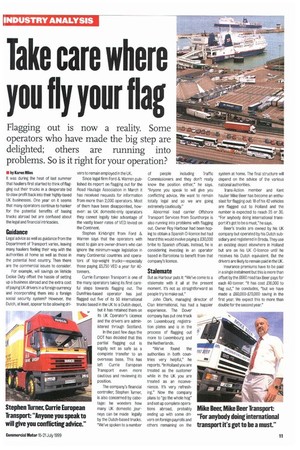Take care where you fly your flag
Page 13

If you've noticed an error in this article please click here to report it so we can fix it.
Flagging out is now a reality. Some operators who have made the big step are delighted; others are running into problems. So is it right for your operation?
• by Karen Miles
It was during the heat of last summer that hauliers first started to think of flagging out their trucks in a desperate bid to claw profit back into their highly-taxed UK businesses. One year on it seems that many operators continue to hanker for the potential benefits of basing trucks abroad but are confused about the legal and financial intricacies.
Guidance
Legal advice as well as guidance from the Department of Transport varies, leaving many hauliers feeling their way with the authorities at home as well as those in the potential host country. Then there are the commercial issues to consider.
For example, will savings on Vehicle Excise Duty offset the hassle of setting up a business abroad and the extra cost of paying UK drivers in a foreign currency and incorporating them into a foreign social security system? However, the Dutch, at least, appear to be allowing dri vers to remain employed in the UK.
Since legal firm Ford & Warren published its report on flagging out for the Road Haulage Association in March it has received requests for information from more than 2000, operators. Most of them have been disappointed, however: as UK domestic-only operators they cannot legally take advantage of the vastly lower rates of VED levied on the Continent.
Stephen Kirkbright from Ford & Warren says that the operators with most to gain are owner-drivers who can ignore the minimum-wage legislation in many Continental countries and operators of top-weight trucks—especially those paying £5,750 VED a year for 40tonners.
Currie European Transport is one of the many operators taking its first careful steps towards flagging out. The Dumfries-based operator has just flagged out five of its 50 international trucks based in the UK to a Dutch depot, but it has retained them on its UK Operator's Licence and the drivers are administered through Scotland.
In the past few days the DOT has decided that this partial flagging out is legally not as safe as a complete transfer to an overseas base. This has left Currie European Transport even more cautious and reviewing its position.
The company's financial controller, Stephen Turner, is also concerned by cabotage: he wonders how many UK domestic journeys can be made legally by the Dutch-based trucks. "We've spoken to a number of people including Traffic Commissioners and they don't really know the position either," he says. "Anyone you speak to will give you conflicting advice. We want to remain totally legal and so we are going extremely cautiously."
Abnormal load carrier Offshore Transport Services from Scunthorpe is also running into problems with flagging out. Owner Roy Harbour had been hoping to obtain a Spanish 0-licence but had heard this would involve paying a £30,000 bribe to Spanish officials. Instead, he is considering investing in an operator based in Barcelona to benefit from that company's licence.
Stalemate
But as Harbour puts it: "We've come to a stalemate with it all at the present moment. It's not as straightforward as people try to make out."
John Clark, managing director of Clan International, has had a happier experience. The Dover company has put one truck on Luxembourg registration plates and is in the process of flagging out more to Luxembourg and the Netherlands.
"We've found the authorities in both countries very helpful," he reports. "In Holland you are treated as the customer while in the UK you are treated as an inconvenience. It's very refreshing." Now the company plans to "go the whole hog" and set up complete operations abroad, probably ending up with some drivers on foreign payrolls and others remaining on the
system at home. The final structure will depend on the advice of the various national authorities.
Trans-Action member and Kent haulier Mike Beer has become an enthusiast for flagging out: 18 of his 42 vehicles are flagged out to Holland and the number is expected to reach 25 or 30. "For anybody doing international transport it's got to be a must," he says.
Beer's trucks are owned by his UK company but operated by his Dutch subsidiary and registered in Breda. They use an existing depot elsewhere in Holland but are on his UK 0-licence until he receives his Dutch equivalent. But the drivers are likely to remain paid in the UK.
Insurance premiums have to be paid In a single instalment but this is more than offset by the £660 road tax Beer pays for each 40-tonner. "It has cost £18,000 to flag out," he concludes, "but we have made a 260,000470,000 saving in the first year. We expect this to more than double for the second year."












































































































